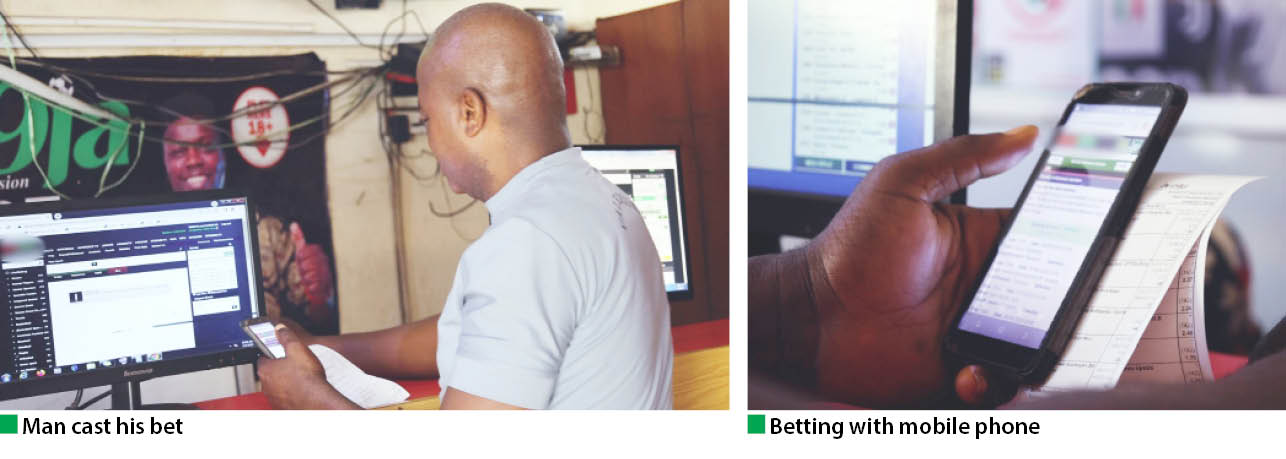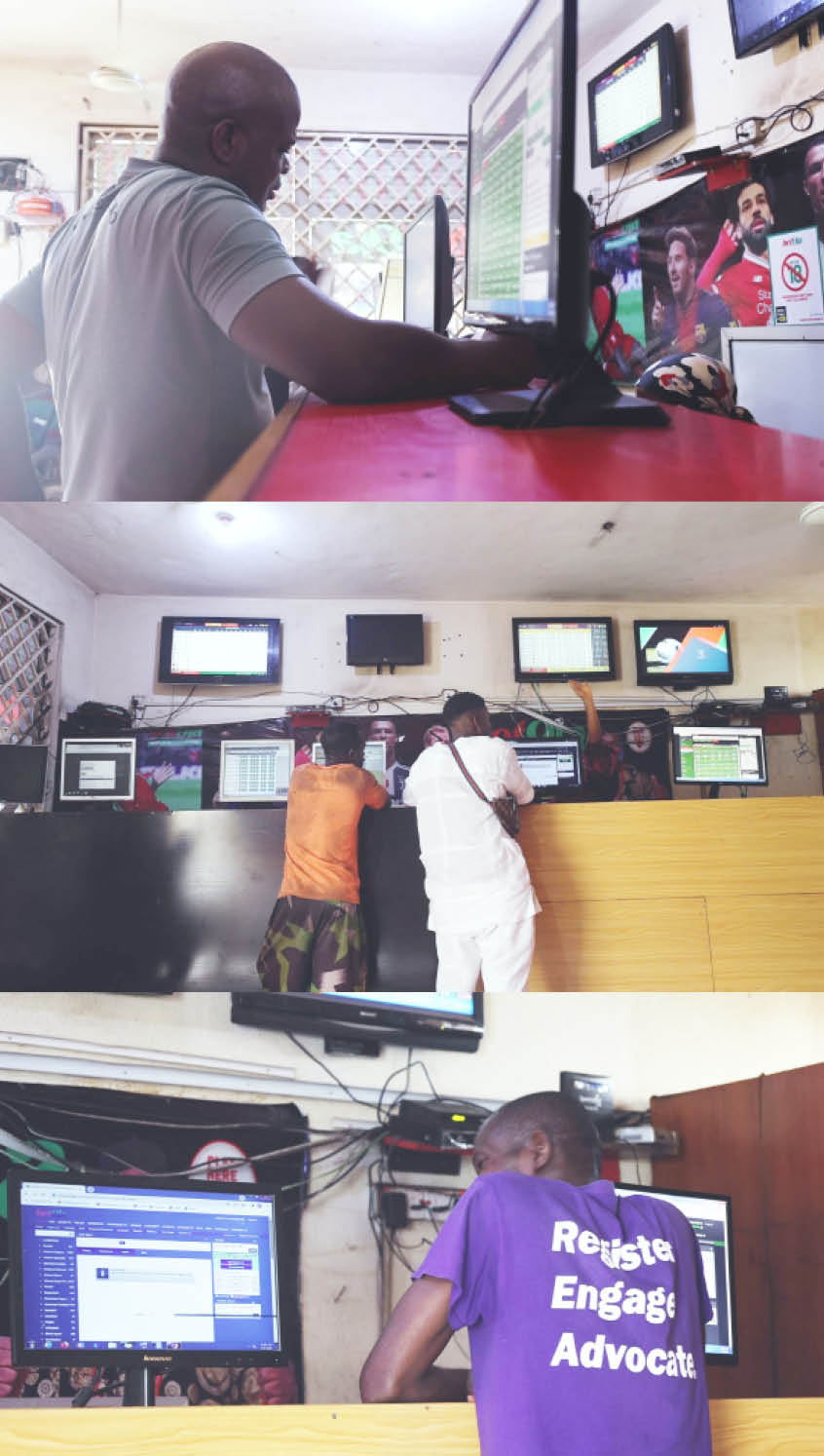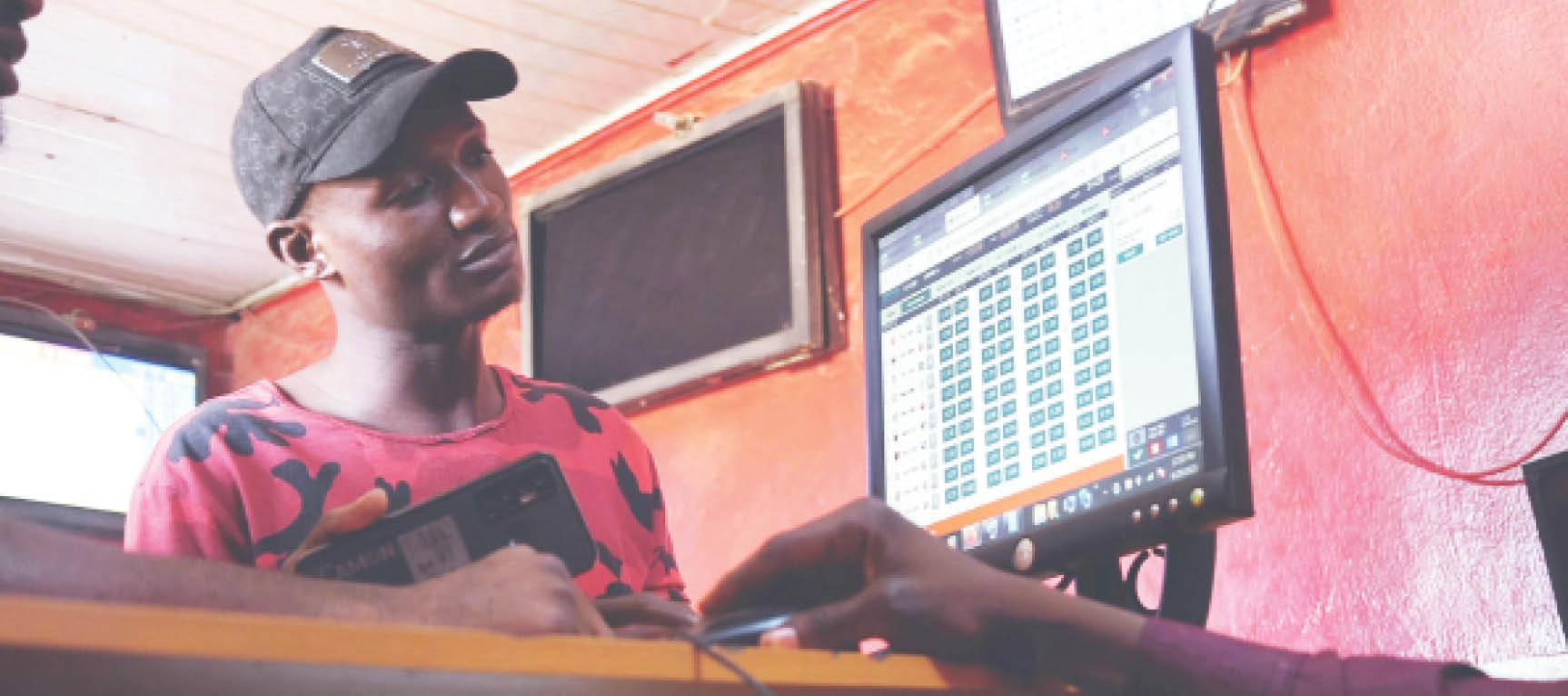By Aaron Atsahyel
A dangerous thrill-seeking behaviour is wreaking havoc in the lives of young people in Nigeria. Arguments, violence, debt, and even death, are just a few of the consequences. Psychologists say the odds are stacked high against people looking to hit the jackpot with sports betting. Daily Trust on Sunday reports.
Romanu Daudu, a 40-year-old man who began sports betting in early 2022, believes he has perfected the art of booking bets on his phone. He has high hopes of winning every day, but he loses most times, yet he believes he would win the following day. Undeterred by his losses, he strongly holds onto a dream of winning the jackpot. And so, every day he walks into a betting shop to try his luck; he doesn’t mind using his last kobo to place a bet.
Narrating his experiences, Dauda said, “I feel bad, especially in soccer when you stake 15 teams and one just end up cutting it; it is very painful.
“I am the type that is limited in how much I stake. The highest stake I have done in sports betting is N800. My bets are mostly within the range of N100 and N200, with a possible return of N40,000 or N50, 000. If it doesn’t come, I just take it and I am cool. So, I always watch what I stake. As time went on, I began to observe visual. Sometimes I blame myself for investing the money.”
- Plateau attacks: Over 200 pastoralists killed in 2 months – MACBAN
- A trip to Maiduguri slum where residents go to school, markets on boats
For Dauda, betting has become a lifestyle that keeps him going. Although he continues to lose, he hopes for better days, which he is yet to experience.
“I know those who have made money from betting, built houses and bought cars. A close friend told me that he used the money he got from betting to furnish his house. It is just what you set your mind on, as well as determination.
“I see that a gambler is always a loser, so anytime I stake my money, I believe it does not belong to me. I try, but I don’t put my mind in it since I am not sure of the outcome; I am just predicting,” he said.

Sports betting is not new in Nigeria. In the old days, gamblers were often ostracised because culturally, they were seen as deviants. But the internet has now made it easy for people to cast their bets, away from the judgemental glare of traditionalists. The availability of electronic mobile devices means that gamblers can now bet in privacy. And more privacy means more risk taking and more gambling, so it is a vicious cycle. Today, you can find betting kiosks on almost every street corner.
Another sports gambler, Amos Achiloko also said, “Everybody is eager to make money, and you don’t need to ask how he makes it. You might not know who has the luck among those that have not started playing. You may win a huge amount of money that would change your life on your first day of playing. I cannot advise anybody now because even if you say they should not play, they will definitely do it. There are people who know how to predict.
“There was a time I had almost N30,000 in my pocket and went to bet. I wanted to try my luck and increase the money, but they finished it; and I had to give them my phone because I played other games, thinking that the one I played would come. It ended up the same way. I collected my phone back when I had the money to pay.
“I felt like going to hug a transformer because that was the only money I had. I felt bad. And I could not do anything about it because I was the one that took myself there to play.”
Isa Mohammed also said, “The number of times I have played and lost is over 75 per cent, ahead of winning. If you calculate the amount of money I have lost since I started playing, it is not up to what I won.
“It is the fastest and easiest way of making double money; it is also the easiest way to become poor. It makes people in cities to relocate to their villagess without anything. I have come to discover that 65 to 75 per cent of games, either visual or normal betting (booking) is lost every day.”

The sports betting industry in Nigeria started booming in the late 2000 when the establishment of the National Lottery Commission gave gamblers legal respite. Then slowly but surely, its dark side revealed itself.
In May 2023, social media was agog with the story of a student of the Federal Polytechnic, Ilaro, Ogun State, Samuel Adekoya, who committed suicide after gambling away his school fees on sports betting sites. He also stole his friend’s fees for more betting. Adekoya’s story is just one of millions whose lives are spiraling out of control in high stakes addiction.
On his part, Ahmed Ayuba said, “If you don’t have the luck you cannot bring it out by force. Some people have the luck, such that they won the first day they played. There is no best man in this game, it is just luck. You can win in your first time of playing and you can play for over three years without winning anything. And you can keep on losing. That is just the fact about it. The negative part is 70 percent while the positive is 30 per cent. The worst thing about this bet is that when you need money the most you will keep on losing.”
It is believed that many Nigerians are into gambling as a result of unemployment and extreme poverty, which are also major factors to the increase in social vices and criminality.
Reacting to the menace of this phenomenon in the society, a psychologist, Beatrice Sina-Olunana said, “People engage in it for expected benefits, and when they don’t get it they will be hopeful, so they keep on investing in it and hoping that one day they would be able to benefit, regardless of their personalities and pocket. In Nigeria specifically, sports and online betting is common among youths.”
Many Nigerians are struggling to make life better, so they are willing to do anything it takes to earn a living.
Another sports gambler, Modiu Saheed said, “There was a time I wanted to pay my house rent and I thought I should play so that the money would increase, but I lost it.
“In betting, it is when you lose your last cash that hunger will hit you. When I played and lost my house rent of N100,000, I was stranded. I was not happy throughout the month until I got another money.”
Betting companies are raking in millions of naira daily as players are losing. A manager of a betting shop in Abuja told Daily Trust on Sunday that over 300 people patronise him everyday to bet away their earnings.
A betting shop manager who preferred to be anonymous said, “I know people who have not won anything for three years, but they keep coming, believing that they would win. I also know people who cash out everyday. When they hear a story of someone who won, like the guy I paid N2 million, the news will encourage them not to give up. That’s how it works. Other people’s winning motivates players. They always have the impression their own time would come, so they won’t stop.”
Another betting shop manager who did not want his name mentioned also said, “It is about prediction on football clubs like Manchester United, Chelsea and Arsenal. There is a virtual aspect of it, which is a computerised game. When you bet, the result comes out within three to four minutes, unlike the live game where you have to wait for 90 minutes and extra time before you see the result.”
Although there is age restriction, many underage people engage in betting, and shop owners are happy to make their money and look the other way.
“It is not helping the society. Sometimes you see players who are not up to 18 years. The danger is that underage players can do anything to get money and book a game,” Isa Mohammed, a gambler said.
A sports betting cashier, Ifeanyi Okonko said, “Anybody below 18 cannot think wisely because he or she is still a child. That is why the game is meant for those who have come of age. An underage player might use his school fees or steal his mother’s money to place a bet. There is no guarantee that you will win.”
With a smart-phone, one can easily bet in Nigeria, even if one is below 18 years of age. It is believed that over 200 million people are up to 18 years and well versed in the use of technology. Almost every young person has access to a smart-phone in Nigeria.
To this end, Beatrice Sina-Olunana said, “Young people have migrated online, so how do you ban it? Even if you ban it, how would you effect the monitoring since it is online? So, what can the society do apart from providing gainful employment? When one is gainfully employed, cases of betting in Nigeria will reduce because I don’t think the country will be able to curb it. You will hardly be able to control anything on the internet.
“Researches show that Nigeria is becoming second or third in Africa, so there are other African countries where the rate is higher. What we can do is to continue to educate the people through community sensitisation, particularly on our youths, on the psychological and financial consequences of gambling. But majorly, government should provide employment for the youth.”
Established by the National Lottery Act of 2005, the Nigeria Lottery Commission is in charge of regulating the betting industry, as well as promote transparency and accountability and protect the interest of players, stakeholders and the general public.
But whose interest are they serving? There are so many unanswered questions.
Sina-Olunana, the psychologist further said, “People commit crimes in order to get money for betting. Gambling is like drug addiction. It is a compulsive disorder, a psychological problem. The individual wants to satisfy the urge, regardless of the consequences; all he wants is the end result of making money.
“This is particularly common in developing countries because of poverty. A young person who is out of job, a school leaver, or a graduate who doesn’t have a job and doesn’t have money, would want to try his hand on some other things. He might not want to go into crime because he sees betting as something mild, but before he knows it he is neck deep into it because of the consequences to the brain. It shifts to brain functioning that deceives him to think that he would make it one day.
“Although there’s a law on gambling in Nigeria, is it being adequately monitored, particularly at the local level?”

 Join Daily Trust WhatsApp Community For Quick Access To News and Happenings Around You.
Join Daily Trust WhatsApp Community For Quick Access To News and Happenings Around You.


